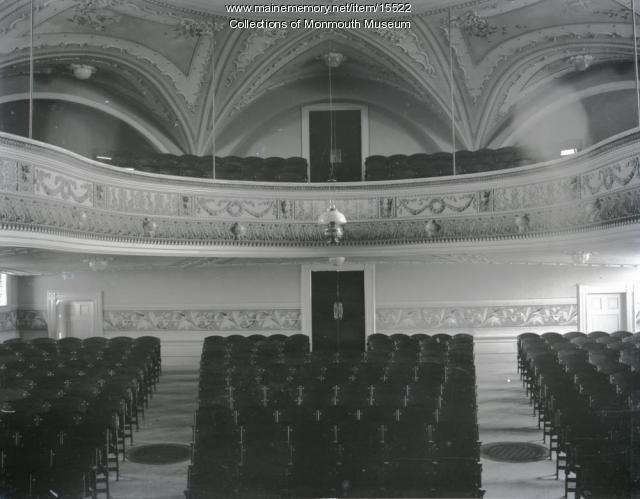Keywords: Women's societies
- Historical Items (1295)
- Tax Records (3)
- Architecture & Landscape (5)
- Online Exhibits (136)
- Site Pages (280)
- My Maine Stories (16)
- Lesson Plans (4)
Online Exhibits
Your results include these online exhibits. You also can view all of the site's exhibits, view a timeline of selected events in Maine History, and learn how to create your own exhibit. See featured exhibits or create your own exhibit
Exhibit
Rum, Riot, and Reform - Bootleggers vs. Police
"X Still Copper Collections of Maine Historical Society 1998.39 a-c Cache of liquor, Portland, 1920Maine Historical Society/MaineToday…"
Exhibit
Rum, Riot, and Reform - Neal Dow
"1885Maine Historical Society Neal Dow (1804-1897), ca. 1880 Collections of Maine Historical Society; gift of Nathan Goold X The Portland…"
Exhibit
Rum, Riot, and Reform - Acknowledgements
"… which was on display at Maine Historical Society in 1998, was made possible through generous support by the Anheuser-Busch Companies and the Edward…"
Exhibit
Rum, Riot, and Reform - Drinking: Elegance and Debauchery
"1840Maine Historical Society Portland Watch or Cracking Notes, ca. 1836 Joseph T. Harris (active 1828-1852) pen on parchment Collections of Maine…"
Exhibit
Fallen Heroes: Those Who Gave Their Lives: World War II
At least twenty-three Jewish men from Maine died in the military during World War II. Photographs and other memorabilia are available for fewer than half of them. Read more about them.
Exhibit
Reuben Ruby: Hackman, Activist
Reuben Ruby of Portland operated a hack in the city, using his work to earn a living and to help carry out his activist interests, especially abolition and the Underground Railroad.
Exhibit
Throughout the history of the state, residents have protested, on paper or in the streets, to increase rights for various groups, to effect social change, to prevent social change, or to let their feelings be known about important issues.
Exhibit
Presque Isle and the Civil War
Presque Isle had fewer than 1,000 residents in 1860, but it still felt the impact of the Civil War. About half of the town's men went off to war. Of those, a third died. The effects of the war were widespread in the small community.
Exhibit
Early Fish Canneries in Brooklin
By the 1900s, numerous fish canneries began operating in Center Harbor, located within the Brooklin community. For over thirty years, these plants were an important factor in the community.
Exhibit
A Brief History of Colby College
Colby originated in 1813 as Maine Literary and Theological Institution and is now a small private liberal arts college of about 1,800 students. A timeline of the history and development of Colby College from 1813 until the present.
Exhibit
Home: The Wadsworth-Longfellow House and Portland - The Wadsworth Era: 1786-1807
"… Elizabeth, 18, were cultured and refined young women whose favorite pastimes (when not helping at home) were reading, writing letters, playing the…"
Exhibit
Music in Maine - Opera, Orchestras and Stages
"Lillian Blauvelt and Opera Fashion Lillian Blauvelt in Romeo and Juliet, London, 1903Maine Historical Society Lillian Blauvelt's fan, ca."
Exhibit
Maine's corn canning industry, as illuminated by the career of George S. Jewett, prospered between 1850 and 1950.
Exhibit
Scientist, author and explorer Donald B. MacMillan established Wiscasset as his homeport for many of the voyages he made to the Arctic region starting in the early 1920s.
Exhibit
Begin Again: reckoning with intolerance in Maine
BEGIN AGAIN explores Maine's historic role, going back 528 years, in crisis that brought about the pandemic, social and economic inequities, and the Black Lives Matter movement in 2020.
Exhibit
Before the era of recorded music and radio, nearly every community had a band that played at parades and other civic events. Fire departments had bands, military units had bands, theaters had bands. Band music was everywhere.
Exhibit
Silk Manufacturing in Westbrook
Cultivation of silkworms and manufacture of silk thread was touted as a new agricultural boon for Maine in the early 19th century. However, only small-scale silk production followed. In 1874, the Haskell Silk Co. of Westbrook changed that, importing raw silk, and producing silk machine twist threat, then fabrics, until its demise in 1930.
Exhibit
"Twenty Nationalities, But All Americans"
Concern about immigrants and their loyalty in the post World War I era led to programs to "Americanize" them -- an effort to help them learn English and otherwise adjust to life in the United States. Clara Soule ran one such program for the Portland Public Schools, hoping it would help the immigrants be accepted.
Exhibit
Northern Threads: Adaptive reuse
A themed vignette within "Northern Threads Part I," featuring up-cycled and reused historic fabrics.
Exhibit
History in Motion: The Era of the Electric Railways
Street railways, whether horse-drawn or electric, required the building of trestles and tracks. The new form of transportation aided industry, workers, vacationers, and other travelers.
Exhibit
Baseball often is called the National Pastime. For many people, baseball is encountered in the backyard and down the street, a game played by a few or the full contingent of a team.
Exhibit
Passamaquoddy Indians from Washington County traveled to Portland in 1920 to take part in the Maine Centennial Exposition. They set up an "Indian Village" at Deering Oaks Park.
Exhibit
In 1954, November 11 became known as Veterans Day, a time to honor American veterans of all wars. The holiday originated, however, as a way to memorialize the end of World War I, November 11, 1918, and to "perpetuate peace through good will and mutual understanding between nations." Mainers were involved in World War I as soldiers, nurses, and workers on the homefront aiding the military effort.
Exhibit
Elise Fellows White: Music, Writing, and Family
From a violin prodigy in her early years to an older woman -- mother of two -- struggling financially, Skowhegan native Mary Elise Fellows White remained committed to music, writing, poetry, her extended family -- and living a life that would matter and be remembered.
























